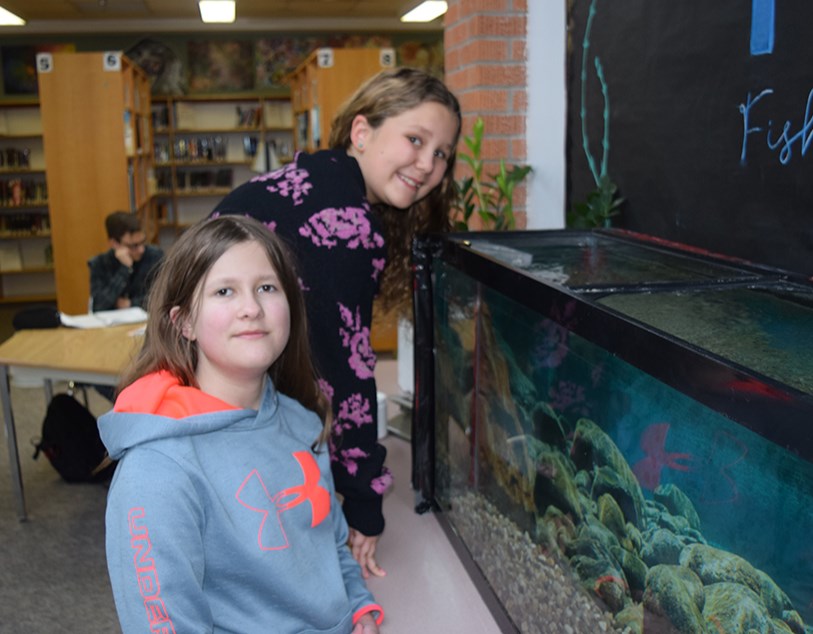CANORA - Canora Composite students are learning about the life cycle of rainbow trout by raising the fish in the school.
The Fish in Schools (FinS) Program began in Saskatchewan in 2013 as a program of the Saskatchewan Wildlife Federation. According to information provided by SWF, the program was adopted from the Alberta Fish in Schools: Raise to Release program. Thanks to the resources provided by the Alberta program, FinS was modified to provide a similar learning experience for students in Saskatchewan.
“I heard about the FinS last year and thought it would be an exciting learning opportunity for our students,” said Canora Composite School Librarian Jennifer Bisschop. “We applied through the Saskatchewan Wildlife Federation and got accepted into the program.”
CCS received 100 rainbow trout eggs on Feb. 1, and within about a week all but two eggs had hatched.
“The eggs are kept in a smaller holding tank inside a 55 gallon fish tank,” said Bisschop. “When the eggs hatched, they entered the alevin stage, which means their yolk sac is still attached to them. They receive all their nutrients from the yolk sack and do not require feeding. Once their yolk sack is absorbed they will start to swim and come to the top. When they enter this stage they are called fry and can be released into the main tank. In June, when fry get bigger, they will be released into Lady Lake.”
Bisschop said almost every student at CCS has expressed interest in the program. Startup costs of around $2,000 were sponsored by River Ridge Fish & Game, and the Buchanan Wildlife Federation.
“The fish tank was set up in the library where all student can have access to it.”
Even the two eggs that didn’t hatch were educational, as students were able to study them under a microscope.
“Mrs. Baillie and her Grade 5 class have taken a special interest in the FinS project,” said Bisschop. "They have been learning about the fish life cycle and their habitat. Her class comes every second day to document and observe the fish. The Grade 5s are also responsible for weighing out the fish food, feeding the fish, and doing biweekly water changes.”
Bisschop said SWF made a special effort to present the FinS material in such a way that it was compatible with the Saskatchewan Education curriculum.
Here is a sample of the information provided by the FinS technical manual.
“FinS is a vehicle for educators to teach students of all ages about trout and their habitat in both indoor and outdoor classroom settings. Over the course of four to five months, students monitor the development of rainbow trout from the egg through the fry stage in an aquarium in their classroom. Students have ample incentive to learn because they soon understand that survival of their fish depends on their ability to maintain a healthy environment in their aquarium. An approved release site is selected with the assistance of the Saskatchewan Wildlife Federation and Ministry of Environment. The class also participates in the release of their fish to complete the program.
“Rainbow trout are not native to Saskatchewan but have been introduced to create new fishing opportunities. As such, rainbow trout survive in some of our waters but are not specifically suited to thrive in a Saskatchewan’s environment. In most waters in the province, rainbow trout cannot naturally reproduce. All the rainbow trout stocked in Saskatchewan are produced at the Saskatchewan Fish Hatchery.
“By raising rainbow trout from egg through fry, students gain an understanding of fish and fish conservation, and are afforded many opportunities for active, hands-on learning about the life cycle and habitat needs of trout. They soon realize trout are “barometers” of environmental health. Students are challenged to identify the habitat requirements of Saskatchewan fish and understand their own personal impact on the aquatic environment,” concluded the information.
Don't count on social media to deliver your local news to you. Keep your news a touch away by bookmarking Canora Courier's homepage at this link.
Bookmark SASKTODAY.ca, Saskatchewan's home page, at this link.




